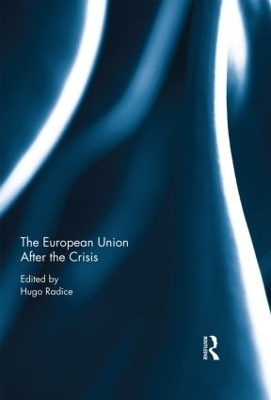
The European Union After the Crisis
Routledge (Verlag)
978-1-138-88973-6 (ISBN)
This book originated from an EU-funded international research network on "Systemic Risks, Financial Crises and Credit: the Roots, Dynamics and Consequences of the Sub-Prime Crisis". Contributions explore and evaluate some of the ways in which the institutions and policies of the European Union and its member states have changed in response to the problems brought about by the crisis. This book was originally published as a special issue of the Journal of Contemporary European Studies.
Hugo Radice is a Life Fellow in the School of Politics and International Studies, University of Leeds, where he taught economics and politics from 1978 to 2008. He now works as an independent researcher in political economy, with particular reference to the recent economic crisis.
Introduction In Memoriam Uwe Becker, 1951-2014 1. Variegated Capitalism, das Modell Deutschland and the Eurozone Crisis 2. The Heterogeneity of Capitalism in Crisis-Ridden Europe 3. German Ordoliberalism as Agenda Setter for the Euro Crisis: Myth Trumps Reality 4. Exploring the Keynesian-Ordoliberal Divide: Flexibility and Convergence in French and German Leaders’ Economic Ideas During the Euro-Crisis 5. From the Maastricht Treaty to Post-Crisis EMU: The ECB and Germany as Drivers of Change 6. Enforcing Austerity in Europe: The Structural Deficit as a Policy Target 7. The European Social Model After the Crisis: The End of a functionalist Fantasy?
| Erscheint lt. Verlag | 27.5.2015 |
|---|---|
| Verlagsort | London |
| Sprache | englisch |
| Maße | 174 x 246 mm |
| Gewicht | 362 g |
| Themenwelt | Sozialwissenschaften ► Politik / Verwaltung ► Europäische / Internationale Politik |
| Sozialwissenschaften ► Politik / Verwaltung ► Staat / Verwaltung | |
| Wirtschaft ► Betriebswirtschaft / Management ► Rechnungswesen / Bilanzen | |
| Wirtschaft ► Volkswirtschaftslehre ► Makroökonomie | |
| ISBN-10 | 1-138-88973-3 / 1138889733 |
| ISBN-13 | 978-1-138-88973-6 / 9781138889736 |
| Zustand | Neuware |
| Haben Sie eine Frage zum Produkt? |
aus dem Bereich


